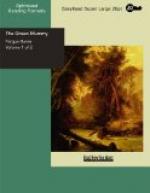Mrs. Jasher’s clothes repaid the thought she expended upon them, and she was artistic in this as in other things. Dressed in a crocus-yellow gown, with short sleeves to reveal her beautiful arms, and cut low to display her splendid bust, she looked perfectly dressed. A woman would have declared the wide-netted black lace with which the dress was draped to be cheap, and would have hinted that the widow wore too many jewels in her hair, on her corsage, round her arms, and ridiculously gaudy rings on her fingers. This might have been true, for Mrs. Jasher sparkled like the Milky Way at every movement; but the gleam of gold and the flash of gems seemed to suit her opulent beauty. Her slightest movement wafted around her a strange Chinese perfume, which she obtained—so she said—from a friend of her late husband’s who was in the British Embassy at Pekin. No one possessed this especial perfume but Mrs. Jasher, and anyone who had previously met her, meeting her in the darkness, could have guessed at her identity. With a smile to show her white teeth, with her golden-hued dress and glittering jewels, the pretty widow glowed in that glimmering room like a tropical bird.
The Professor raised his dreamy eyes and laid the beetle on one side, when his brain fully grasped that this charming vision was waiting to be entertained. She was better to look upon even than the beloved scarabeus, and he advanced to shake hands as though she had just entered the room. Mrs. Jasher—knowing his ways— rose to extend her hand, and the two small, stout figures looked absurdly like a pair of chubby Dresden ornaments which had stepped from the mantelshelf.
“Dear lady, I am glad to see you. You have—you have”—the Professor reflected, and then came back with a rush to the present century—“you have come to dinner, if I mistake not.”
“Lucy asked me a week ago,” she replied tartly, for no woman likes to be neglected for a mere beetle, however ancient.
“Then you will certainly get a good dinner,” said Braddock, waving his plump white hands. “Lucy is an excellent housekeeper. I have no fault to find with her—no fault at all. But she is obstinate—oh, very obstinate, as her mother was. Do you know, dear lady, that in a papyrus scroll which I lately acquired I found the recipe for a genuine Egyptian dish, which Amenemha— the last Pharaoh of the eleventh dynasty, you know—might have eaten, and probably did eat. I desired Lucy to serve it to-night, but she refused, much to my annoyance. The ingredients, which had to do with roasted gazelle, were oil and coriander seed and—if my memory serves me—asafoetida.”




